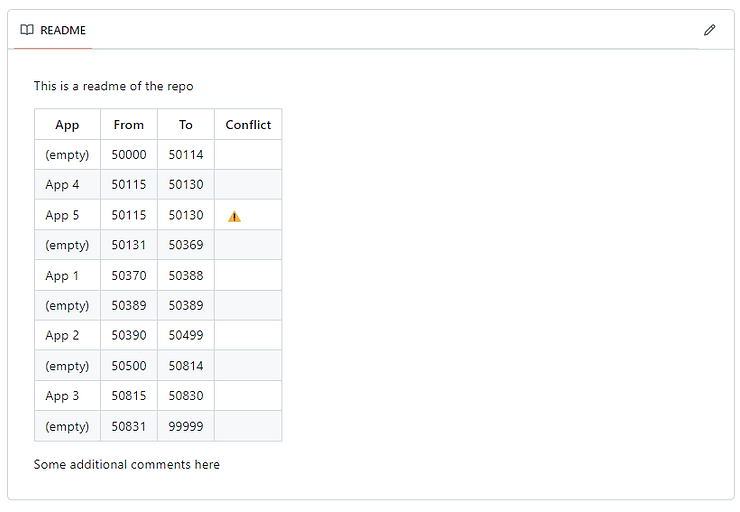How to Manage Multiple Business Central Apps in a Single GitHub Repo with Workflows 🚀
Managing multiple apps for Microsoft Business Central in a single GitHub repository can seem challenging at first, but with the right tools and workflows, it becomes super easy and efficient! In this blog, I'll walk you through how to handle multiple apps in one repo, detect conflicts in app ranges, and automatically update your README.md using a GitHub workflow. Let’s dive right in! 💡
Do you want an autoupdated readme like that one?

Why Use One Repo for Multiple Business Central Apps? 🤔
Keeping multiple Business Central apps in one repository allows you to:
- Streamline your workflow: Manage all apps from one central location.
- Collaborate more effectively: Teams can work on different apps within the same project.
- Reduce repo clutter: No need to maintain a separate repository for each app.
However, it can get tricky when apps have overlapping object ranges, especially when apps need to use different sections of the Business Central range. But don’t worry—GitHub workflows can automate the process of checking for these overlaps! 👨💻👩💻
Automating Conflict Detection with GitHub Workflows ⚙️
GitHub workflows can automate your repository tasks, like checking for app range conflicts and updating documentation. Below is an example workflow that detects conflicts between multiple Business Central apps and helps you maintain control over their from and to ranges. 🚨
This is also available on our demo showcase in our GitHub Organization: https://github.com/byndit/PTE-Readme-Workflow
Step 1: Set Up Your GitHub Workflow
Create a .github/workflows/update-readme.yml file in your repo. This workflow will:
- Generate a table of apps and their object ranges.
- Check for conflicts where two apps might use overlapping object ranges.
- Update the README.md with the app information and flag any conflicts with an emoji! ⚠️
name: Update README with Table
on:
push:
branches: [main]
workflow_dispatch: # Allows manual triggering of the workflow
jobs:
update-readme:
runs-on: ubuntu-latest
steps:
- name: Checkout repository
uses: actions/checkout@v2
- name: Set up Node.js
uses: actions/setup-node@v2
with:
node-version: "14"
- name: Generate repository folder information
id: generate_table
run: |
START_FROM=50000
MAX_TO=99999
ROWS=()
DECLARED_RANGES=()
mapfile -t SORTED_ROWS < <(
find . -maxdepth 2 -type f -name "app.json" -exec dirname {} \; | while IFS= read -r folder; do
FROM=$(grep -m 1 '"from":' "$folder/app.json" | sed 's/[^0-9]*//g')
TO=$(grep -m 1 '"to":' "$folder/app.json" | sed 's/[^0-9]*//g')
NAME=$(grep -m 1 '"name":' "$folder/app.json" | sed 's/.*"name": "\(.*\)".*/\1/')
if [ "$FROM" ] && [ "$TO" ] && [ "$NAME" ]; then
echo "$FROM:$TO:$NAME"
fi
done | sort -t':' -k1,1n
)
TABLE="| App | From | To | Conflict |\n|------------------------------------|--------|--------|-----------|"
PREV_TO=$((START_FROM - 1))
overlap() {
local range_from=$1
local range_to=$2
local existing_from=$3
local existing_to=$4
if [ "$range_from" -le "$existing_to" ] && [ "$range_to" -ge "$existing_from" ]; then
return 0
else
return 1
fi
}
for row in "${SORTED_ROWS[@]}"; do
FROM=$(echo "$row" | cut -d':' -f1)
TO=$(echo "$row" | cut -d':' -f2)
NAME=$(echo "$row" | cut -d':' -f3)
CONFLICT=""
for declared_range in "${DECLARED_RANGES[@]}"; do
DECLARED_FROM=$(echo "$declared_range" | cut -d':' -f1)
DECLARED_TO=$(echo "$declared_range" | cut -d':' -f2)
if overlap "$FROM" "$TO" "$DECLARED_FROM" "$DECLARED_TO"; then
CONFLICT="⚠️"
break
fi
done
DECLARED_RANGES+=("$FROM:$TO")
if [ "$PREV_TO" -lt "$((FROM - 1))" ]; then
GAP_FROM=$((PREV_TO + 1))
GAP_TO=$((FROM - 1))
TABLE+="\n| (empty) | $GAP_FROM | $GAP_TO | |"
fi
TABLE+="\n| $NAME | $FROM | $TO | $CONFLICT |"
PREV_TO=$TO
done
if [ "$PREV_TO" -lt "$MAX_TO" ]; then
GAP_FROM=$((PREV_TO + 1))
GAP_TO=$MAX_TO
TABLE+="\n| (empty) | $GAP_FROM | $GAP_TO | |"
fi
echo -e "$TABLE" > table.md
cat table.md
shell: bash
- name: Create README.md if not exists
run: |
if [ ! -f README.md ]; then
echo -e "# This project contains several PTE modules." > README.md
fi
- name: Update README.md with placeholder
run: |
echo "Current README.md before update:"
cat README.md
sed -i '/\[comment\]: <> (start_table)/,/\[comment\]: <> (end_table)/c [TABLE_PLACEHOLDER]' README.md
echo "README.md after inserting placeholder:"
cat README.md
sed -i '/\[TABLE_PLACEHOLDER\]/{
a [comment]: <> (start_table)
r table.md
a
a [comment]: <> (end_table)
d
}' README.md
echo "README.md after updating table:"
cat README.md
git add README.md
git diff --cached
git status
- name: Check if README.md has changed
id: check_diff
run: |
git diff --exit-code README.md || echo "README.md has been modified"
- name: Commit and push changes if README.md has changed
if: steps.check_diff.outcome == 'success'
run: |
git config --local user.email "github-actions[bot]@users.noreply.github.com"
git config --local user.name "GitHub Actions Bot"
git commit -m "Update README.md with generated table" || echo "No changes to commit"
git push || echo "Nothing to push"
env:
GITHUB_TOKEN: ${{ secrets.GITHUB_TOKEN }}How This Workflow Works 🛠️
- Detect App Ranges: The workflow loops through each app's app.json file to extract the from, to, and name values. These values are then stored in a list.
- Check for Overlaps: The overlap function compares each app’s range with previously declared ranges. If any range overlaps with another app’s range, a conflict marker (⚠️) is added to the table.
- Auto-update README: After processing, the table is inserted into your README.md file between predefined comment markers ([comment]: <> (start_table) and [comment]: <> (end_table)). This ensures that the table is always up to date.
Handling App Conflicts Easily ⚠️
Having multiple apps in a Business Central repo can lead to conflicts in object ranges, but with this workflow:
- You get automatic detection of conflicts between apps.
- The conflict is marked in your README file with a ⚠️ emoji so it's easy to spot potential issues.
- You’ll know exactly which app ranges need adjustment before deployment!
Keeping Your Team on the Same Page 🤝
Managing multiple apps in one repo is a smart way to streamline Business Central development, but staying organized is key! By using GitHub workflows, you can:
- Automate documentation: Keep your repo up to date without manual editing.
- Prevent app conflicts: The workflow handles range checking, so no more manual checks!
- Collaborate seamlessly: Ensure everyone on the team knows what ranges are in use and where conflicts exist.
Final Thoughts 💬
With this GitHub workflow, managing multiple Business Central apps becomes a breeze! You can easily prevent conflicts, update your documentation, and keep everything running smoothly. 🚀
Now that you know how to manage multiple Business Central apps in one repo with ease, it’s time to put this into practice! 👨💻👩💻
Do you have any other Business Central challenges you'd like to automate? Let me know in the comments! 💬
Happy coding! ✨



